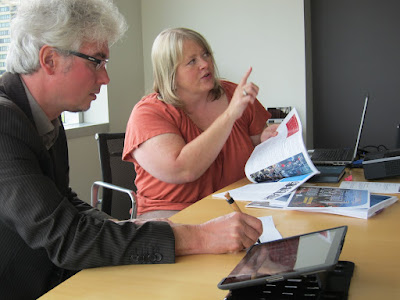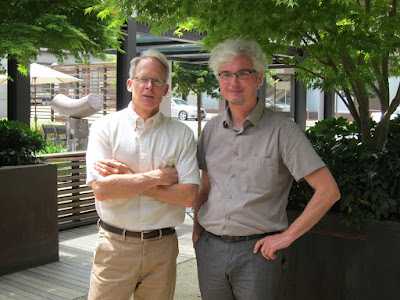South of Copenhagen's blustery winters and rolling plains, in the foothills of the Pyrénées, lies temperate Toulouse, France's 4th largest metropolitan area. Last week, a high level delegation from Copenhagen captured Portland's attention, while another First Stop Portland visitor went largely unnoticed.
Phillipe Goirand is an elected representative overseeing development of the bicycle network for the City of Toulouse. He also serves as the Transportation Secretary for the regional government, Communauté Urbaine du Grand Toulouse (trans. Urban Community of Greater Toulouse). Fresh off the Velo-City Global 2012 conference in Vancouver, BC, Goirand arrived in Portland eager to discuss Portland's bicycle efforts and share insights from his North American tour.
He started off his visit getting background from Bureau of Planning and Sustainability program manager Michele Crim, who went over how bicycling fits into Portland's Climate Action Plan. She explained that, while we're doing pretty well by American standards, we need to significantly increase both bicycle and transit ridership in order to meet our 2030 CAP goals. An important point in the bicycle as transportation strategy, she emphasized, is seeing the bicycle as a local economic driver in addition to a transportation option.
 | |||||||
| Michele Crim, Sustainability Manager, BPS, goes over Portland's Climate Action Plan with Phillippe Goirand, from Toulouse, France. |
 |
| Goirand visits one of Portland's premier recreation spaces, Jamsion Square in Portland's Pearl District |
So what are the current transportation planning "must haves" in Toulouse?
- The same refrain rings out in cities around the globe: bicyclist and pedestrian safety is a primary transportation issue.
- Putting bike lanes on all neighborhood streets is necessary so bikes have equitable access to city streets.
- Where there's no space to do it, create the space to do it. Goirand noted the Eastbank Esplanade as a premier example of making space for bikes and pedestrians where none previously existed.
- Thinking about streets as shared space where people and their transportation modes peacefully coexist. Call them Complete Streets (Geneva), Woonerfs (Amsterdam), or Zone de Rencontrer (Toulouse), but considering streets as "pacified zones" rather than war zones is the way to go.
- Good signage is important. Portland has really good signage, Goirand observed, and Toulouse should follow suit.
- Narrowing streets, making more room for bikes, less room for automobiles. In Goirand's terms, Portland could "create friction" for automobiles in urban space. "They move too fluidly here," he lamented.
- Architectural achievements can be incorporated in transportation projects.
- Pro-bicycle policies like Toulouse's E-Bike subsidy program, which helped offset the costs of purchasing electric bicycles. (Although 65% percent of the people they subsidized adopted the bike as their primary form of commuting, the city found the program too costly and it's is now on the chopping block.)
- What's so crazy about a car-free cultural district downtown? What if Portland didn't allow autos on streets with cultural attractions? And then, it made admission to the attractions free? It'd be like Sunday Parkways all week long. Imagine a car-free Park Blocks running the length of the city.
 |
| Metro Councilor Rex Burkholder (left) with Goirand |
"In France, we have no planners..."
Goirand reiterated his appreciation for Portland's integrated transportation and land use planning efforts, especially efforts to incorporate green house gas emissions into all regional land-use planning models, as Burkholder explained to him.. Goirand said a lack of similar integration is really hurting his region, where many large projects are built without any consideration for the impacts on nearby land-uses or transportation. However, he observed, Portland can do better. The city has so many plans that they need to be integrated somehow. (This isn't the first time we've heard this.) This complexity might be resolved by making sure that each of the plans refers directly to other existing plans. Furthermore, while Portland's plans are admirable with respect to civic engagement, Goirand wondered where government accountability and plan evaluation enter the picture. Finally, he exhorted Portland's leaders to focus on creating safer streets by increasing pedestrian and bicyclist facilities while limiting the automobile : "You have the space to do it. You just have to be willing to use it that way."

A great part of these visits is what I learn from the visitors. The Phillipe take-awy that still sticks with me is his question about why we worry so much about making use of cars so convenient. He wonders why anyone would ride a bike when there is so little traffic congestion and parking is so plentiful and cheap. What motivates his public to use alternate transportation is the horrible traffic in a city with narrow streets and no interest is tearing down buildings to accommodate cars. He also pointed to our overly wide streets as great opportunities to build real quality bike facilities. With typically 5 lanes for cars (three for moving, two for parking) he sees tremendous waste of valuable space and much easier potential for conversion to wider sidewalks and cycle tracks. Allez, Portland!
ReplyDelete